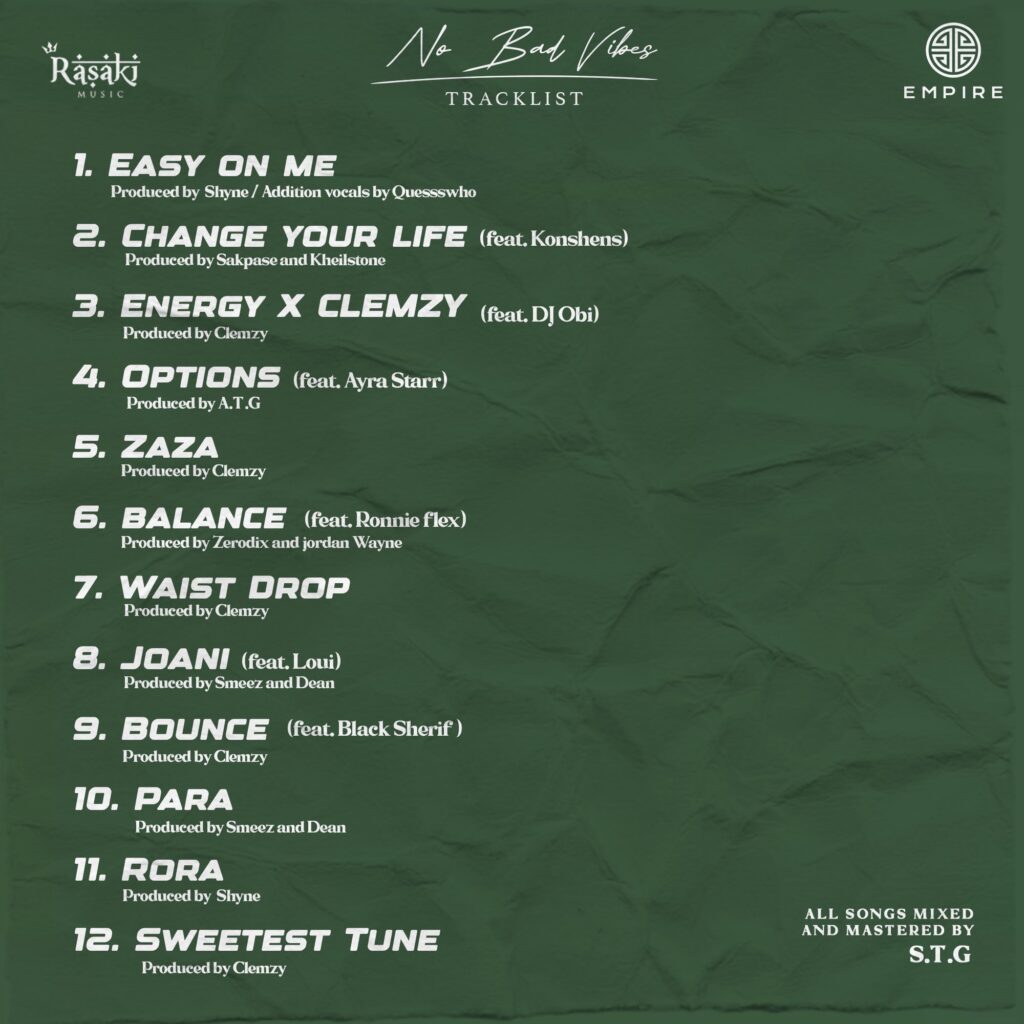No Bad Vibes sounds too predictable. From the tracklisting to the chosen topics. L.A.X over-explored Amapiano on this album. Most times, you wonder if he cannot do without that South African deep house sub-genre…
By Emmanuel Daraloye
The catchphrase, “No Bad, Vibes” has been in use for a long time in the social space. It has been in use alongside “No Bad Energy,” and other feel-good sayings among Nigerians. Just last week, music star, L.A.X, repurposed No Bad Vibes as the title of his third album, his first project release in about two years.
L.A.X is not a greenhorn in the Nigerian music industry. Although he might not have gotten the anticipated sonic exploit as expected, the founder of Rasaki Music Group has created some monster hits, his last being “Sempe,” which has been streamed more than 77,000,000 times, according to the Spotify date file.
Born to Mr. Taiwo Afolabi, a Nigeria business magnate, L.A.X had his secondary education at Nigeria-Turkish School, Lagos State. He thereafter leveled it up with two degrees at universities in the United Kingdom. In 2013, while rounding off his Masters Degree programme at the University of Manchester, United Kingdom, L.A.X was announced as one of Wizkid’s new signee in 2013. “Caro,” his first song under Starboy Records, made its mark. The ubiquitous record became L.A.X’s breakout single.
Exactly a decade after the signing, L.A.X has made some indelible marks. He has moved from Starboy records, created his record label and even had a distribution deal with Empire Music. No Bad Vibes is L.A.X’s second album distributed under Empire. The anticipation and promotion for the new album has been on for more than a year. Finally, the fans have the project on their distribution platforms.
“Option,” the bouncy collaboration with music star, Ayra Starr, serves as the first pre-released single off this album. Tracks like “Waist Drop,” “Rora,” “Zaza,” were also released before the album dropped.
A guitar chord welcomes you on the opening “Easy on Me.” A vulnerable L.A.X comes up on this track. He laments about the antics of his lover: her lack of attention, and unfaithfulness.
Jamaican singer and disc Jockey, Konshens, brings a Caribbean aura to “Change Your Life.” This record sounds like a response to “Easy on Me,” an epistle to a girl who seems to not have time for L.A.X.
(Read also: Is Paybac Iboro’s West African Goat LP a Potential Hip-hop Album of The Year?)

Produced by DJ Obi and Clemzy, “Energy,” has its elements embedded into Amapiano. This time around, the production is stripped down, allowing L.A.X’s vocals to swirl through your ears. He dances around the instrumental and attempts to create another hit.
Ayra Starr and L.A.X are into their emotions on “Options.” This track seems to epitomise what it feels like to date celebrities. While it is obvious that L.A.X is in love and adores the girl, he also has his eyes on other women. On her part, Ayra Starr wants her man solely to herself. It’s a dilemma even some non-celebrities might relate to.
L.A.X is more animated on “Zaza.” The boppy tune is anthemic and self-celebratory in the same breath. The poignant, intermittent guitar pick is beautiful to hear. The boisterous production makes the mundane lyrics on this song less noticeable.
An additional verse from Dutch rapper, Ronnie Flex, takes “Balance” to another level. Too many things were happening on the instrumental, and it’s hard not to notice the chaotic state of the production.
The Clemzy-produced “Waist Drop” is a beautiful tribute to the backside. Still an Amapiano record. The lyrics are copious even though L.A.X is sometimes repetitive. Perhaps, it’s one of his ploys to make his words sink in.
“Joani” explores R&B. L.A.X is in a party mood on this track. He finds it difficult to stay on topic on this song. When he’s not talking about love, he is singing about the lady’s waist, and then, about “banana.” Surely, L.A.X has many things on his mind.
Black Sherif and L.A.X bring a sonic arsenal to play on “Bounce.” They both bounce on each other’s energy to create this mid-tempo tune.
“Para” continues the Amapiano wave of this album. Nothing is strange or new. A forceful L.A.X comes up on the second verse, more essentially when he talks about money. “Para” is created for the club.

“Rora,” and “Sweetest Tune” end No Bad Vibes. On the former, L.A.X takes the listeners to the club for the umpteenth time. On the latter, he explores an “Owambe” type of beat to express his love interest to a girl. The song gives off a party feeling.
No Bad Vibes sounds too predictable. From the tracklisting to the chosen topics. L.A.X over-explored Amapiano. Most times, you wonder if he cannot do without that South African deep house sub-genre.
No Bad Vibes is L.A.X’s attempt to build up on the rotations that ZaZa Vibes made three years ago. Just like the title says, L.A.X seems to stay true to the title.
Tracks like “Rara,” “Para,” are attempts to create club hits. L.A.X was all out to create another “Sempe.”

Lyrically, No Bad Vibes doesn’t elevate L.A.X’s artistry. Ladies’ behinds and money were the dominant topics on this album. I see an artiste who is stuck in his comfort zone. His lyrics are sparse, and although it’s public knowledge that L.A.X has never been a good lyricist but more of a melodious artiste, with over a decade in the music industry, there ought to have been some improvement in crafting lyrics.
On No Bad Vibes, L.A.X tends to excel more on Amapiano. Sometimes, this gets too monotonous. What I see is an artiste who hasn’t attempted to expand his sonic range, but one who has pigeonholed himself and feels comfortable with it.
Lyricism – 1
Tracklisting – 1
Sound Engineering – 1
Vocalisation – 1
Listening Experience – 1
Rating: 5/10
Emmanuel Daraloye is Africa’s Most Prolific Freelance Music Critic. He has over 500 album reviews in his archive.



